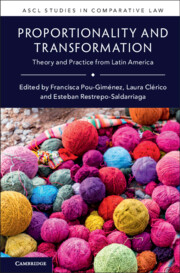Book contents
- Proportionality and Transformation
- Ascl Studies in Comparative Law
- Proportionality and Transformation
- Copyright page
- Contents
- Editors
- Contributors
- Acknowledgments
- Introduction
- Part I Proportionality and Processes of Constitutionalization
- 1 The Standard Reasonableness Test and Proportionality in Argentina
- 2 Proportionality in the Case Law of the Constitutional Court of Ecuador
- 3 Proportionality and Human Rights in Mexico
- 4 Proportionality and the Construction of Democracy
- 5 Proportionality in the Case Law of the Chilean Constitutional Court
- Part II Proportionality in Social Rights and Equality-Based Adjudication
- Part III Proportionality, between Transformation and the Status Quo
- Index
1 - The Standard Reasonableness Test and Proportionality in Argentina
A Matter of Interactions
from Part I - Proportionality and Processes of Constitutionalization
Published online by Cambridge University Press: 27 October 2022
- Proportionality and Transformation
- Ascl Studies in Comparative Law
- Proportionality and Transformation
- Copyright page
- Contents
- Editors
- Contributors
- Acknowledgments
- Introduction
- Part I Proportionality and Processes of Constitutionalization
- 1 The Standard Reasonableness Test and Proportionality in Argentina
- 2 Proportionality in the Case Law of the Constitutional Court of Ecuador
- 3 Proportionality and Human Rights in Mexico
- 4 Proportionality and the Construction of Democracy
- 5 Proportionality in the Case Law of the Chilean Constitutional Court
- Part II Proportionality in Social Rights and Equality-Based Adjudication
- Part III Proportionality, between Transformation and the Status Quo
- Index
Summary
Proportionality analysis is considered a central tool for rights adjudication in contemporary constitutional law. Prevailing academic narrative explains its worldwide spread as a matter of legal migration. This chapter challenges this narrative through the analysis of Argentine constitutional practice. It reconstructs the different variants of proportionality scrutiny that have been applied by the Argentinian Supreme Court from the beginnings of the twentieth century, well before the development of the modern proportionality test by the German Constitutional Court, and surveys its role in the adjudication not only of civil and political rights but also social rights. It ultimately argues that constitutional practices in this domain are better explained under a paradigm of interaction, rather than under one of migration.
Keywords
- Type
- Chapter
- Information
- Proportionality and TransformationTheory and Practice from Latin America, pp. 21 - 40Publisher: Cambridge University PressPrint publication year: 2022

